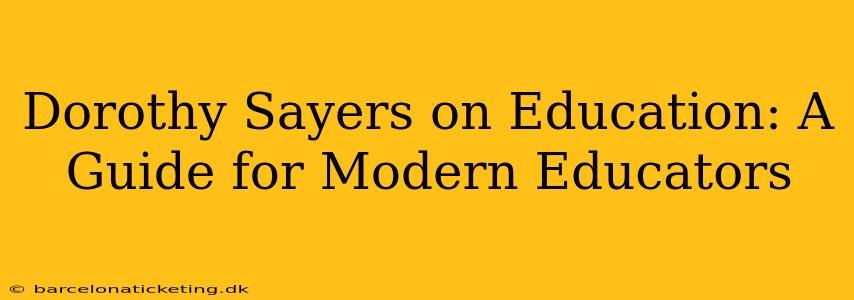Dorothy L. Sayers, renowned for her detective fiction featuring Lord Peter Wimsey, was also a brilliant essayist and public intellectual with profound insights into education. Her 1947 essay, "The Lost Tools of Learning," remains remarkably relevant today, offering a potent critique of modern educational systems and a compelling vision for a more holistic approach. This article explores Sayers's key ideas and their enduring significance for educators in the 21st century.
What are the lost tools of learning according to Dorothy Sayers?
Sayers argued that modern education had lost crucial "tools" – the traditional arts of grammar, logic, and rhetoric – which were essential not just for academic success but for the development of well-rounded individuals capable of critical thinking and effective communication. These tools, she believed, were the foundation upon which all other learning could be built, providing the intellectual scaffolding for understanding complex ideas and expressing them clearly. She didn't advocate for a rigid return to rote learning, but rather for a revitalized understanding of these disciplines as pathways to intellectual freedom and mastery.
What is the significance of the Trivium in Sayers' educational philosophy?
The core of Sayers's educational philosophy rests on the Trivium – grammar, logic, and rhetoric – a classical curriculum structure. She saw grammar not merely as the study of rules but as a gateway to understanding the underlying structure of language, thought, and reality. Logic, for Sayers, wasn't just formal deduction but a method of clear and precise thinking, enabling individuals to analyze arguments and form reasoned judgments. Rhetoric, the art of effective communication, was crucial for expressing these well-formed thoughts persuasively and engagingly. Mastering the Trivium, Sayers believed, equips individuals with the intellectual tools to navigate the complexities of life and engage in meaningful discourse.
How does Sayers's approach differ from modern educational methods?
Sayers's approach contrasts sharply with many modern educational methods that prioritize specialized knowledge and vocational training at the expense of a broad, liberal education. She criticized the tendency to fragment knowledge into isolated subjects, neglecting the interconnectedness of ideas and the development of integrated understanding. Sayers championed a holistic education that fosters critical thinking, creativity, and effective communication skills – attributes she saw as essential for responsible citizenship and personal fulfillment, irrespective of career aspirations.
What is the role of the Quadrivium in Sayers’ educational philosophy?
While the Trivium formed the foundation of Sayers's educational ideal, she also recognized the importance of the Quadrivium – arithmetic, geometry, music, and astronomy. These subjects, she argued, cultivate different aspects of the mind and foster abstract reasoning and an appreciation for order and harmony in the universe. Though less directly linked to communication skills than the Trivium, the Quadrivium contributes to a well-rounded education by enhancing intellectual curiosity and analytical capabilities.
How can Sayers's ideas be implemented in modern classrooms?
Implementing Sayers's ideas in modern classrooms requires a shift in pedagogical approach. This involves incorporating active learning strategies that encourage critical thinking, debate, and effective communication. It means moving beyond rote memorization towards a deeper understanding of concepts and their application in real-world contexts. Incorporating classical literature, philosophy, and rhetoric into the curriculum can help students develop their analytical and communication skills. Furthermore, interdisciplinary approaches that connect different subject areas can foster a more integrated and meaningful learning experience, reflecting Sayers's vision of a holistic education.
What are the lasting impacts of Sayers’ educational philosophy?
Sayers's ideas continue to resonate with educators and reformers who seek to move beyond the limitations of standardized testing and vocational training. Her emphasis on the development of critical thinking, communication, and a holistic understanding of the world remains incredibly relevant in an increasingly complex and interconnected society. The enduring appeal of her work lies in its call for an education that cultivates not just specialized knowledge but also well-rounded, intellectually capable, and engaged citizens. Her vision reminds us of the importance of fostering a love of learning and a capacity for critical engagement with the world, essential components of a truly successful and fulfilling education.
Author's Note: This article provides a comprehensive overview of Dorothy Sayers's educational philosophy. Further research into her writings, particularly "The Lost Tools of Learning," is recommended for a deeper understanding of her ideas and their application in contemporary education.

